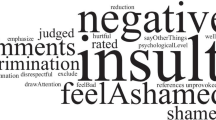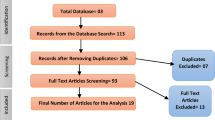Abstract
The present study replicated and extended research on the effects of observer characteristics (i.e., gender and traditional vs. less traditional attitudes) on attributions of responsibility in a case of sexual harassment. Participants (120 males, 120 females) were randomly assigned to one of six conditions that varied the gender of the victim and the victim's reaction. A sexual harassment scenario involving a university student and professor of the opposite gender was presented as an audiotape of the victim's account. Participants with less traditional attitudes attributed less responsibility to the victim than did participants with traditional attitudes. Females attributed more responsibility to the perpetrator and the victim of the same gender than did males. Victim reaction interacted with participant gender; males responded in a manner that was consistent with the reaction manipulation, whereas females attributed less responsibility to the self-blaming victim than to either the perpetrator-blaming or control victims. The results are discussed in the light of attribution theory and previous research.
Similar content being viewed by others
References
Bulman, R. J., & Wortman, C. B. Attributions of blame and coping in the “real world”: Severe accident victims react to their lot. Journal of Personality and Social Psychology, 1977, 35, 351–363.
Cammaert, L. P. How widespread is sexual harassment on campus? International Journal of Women's Studies, 1985, 8, 388–396.
Coates, D., Wortman, C. B., & Abbey, A. Reactions to victims. In I. H. Frieze, D. Bar-Tel, & J. S. Carroll (Eds.), New approaches to social problems. San Francisco: Jossey-Bass, 1979.
Gutek, B. A. A psychological examination of sexual harassment. In B. A. Gutek (Ed.), Sex role stereotyping and affirmative action policy. Los Angeles: Institute of Industrial Relations, 1982.
Gutek, B. A., Morasch, B., & Cohen, A. G. Interpreting social-sexual behavior in a work setting. Journal of Vocational Behavior, 1983, 22, 30–48.
Janoff-Bulman, R. Characterlogical versus behavioral self-blame: Inquiries into depression and rape. Journal of Personality and Social Psychology, 1979, 37, 1798–1809.
Janoff-Bulman, R. Esteem and control bases of blame: “Adaptive” strategies for victims versus observers. Journal of Personality, 1982, 50, 180–192.
Jensen, I. W., & Gutek, B. A. Attribution and assignment of responsibility in sexual harassment. Journal of Social Issues, 1982, 38, 121–136.
Jones, T. S., Remland, M. S., & Brunner, C. C. Effects of employment relationship, response of recipient and sex of rater on perceptions of sexual harassment. Perceptual and Motor Skills, 1987, 65, 55–63.
Krulewitz, J. E. Reactions to rape victims: Effects of rape circumstances, victim's emotional response, and sex of helper. Journal of Counseling Psychology, 1982, 29, 645–654.
Lerner, M. J., & Miller, D. T. Just world research and the attribution process: Looking back and ahead. Psychological Bulletin, 1978, 85, 1030–1051.
Lerner, M. J., & Simmons, C. Observer's reaction to the “innocent victim”: Compassion or rejection? Journal of Personality and Social Psychology, 1966, 4, 203–210.
Reilly, T., Carpenter, S., Dull, V., & Bartlett, K. A factorial survey: An approach to defining sexual harassment on campus. Journal of Social Issues, 1982, 38, 99–110.
Shaver, K. G. Defensive attribution: Effects of severity and relevance on the responsibility assigned for an accident. Journal of Personality and Social Psychology, 1970, 14, 101–113.
Shaw, J. I., & McMartin, J. A. Personal and situational determinants of attribution of responsibility for an accident. Human Relations, 1977, 30, 95–107.
Smith, E. R., Ferree, M. M., & Miller, F. D. A short scale of attitudes toward feminism. Representative Research in Social Psychology, 1975, 6, 51–56.
Tangri, S. S., Burt, M. R., & Johnson, L. B. Sexual harassment at work: Three explanatory models. Journal of Social issues, 1982, 38, 33–54.
Weber-Burdin, E., & Rossi, P. H. Defining sexual harassment on campus: A replication and extension. Journal of Social issues, 1982, 38, 111–120.
Author information
Authors and Affiliations
Rights and permissions
About this article
Cite this article
Valentine-French, S., Radtke, H.L. Attributions of responsibility for an incident of sexual harassment in a university setting. Sex Roles 21, 545–555 (1989). https://doi.org/10.1007/BF00289103
Issue Date:
DOI: https://doi.org/10.1007/BF00289103




